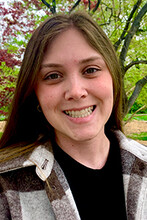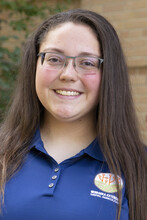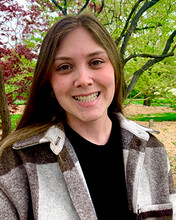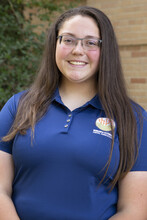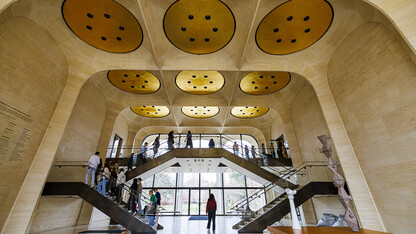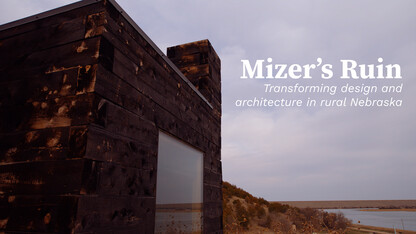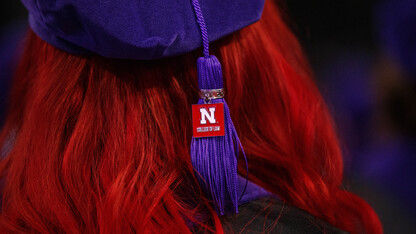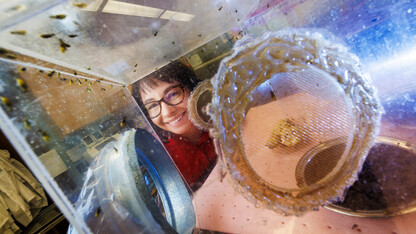· 6 min read
Research boosts IANR undergrads’ educational, personal development
For Husker undergraduates in agriculture and natural resources studies, hands-on research opportunities — whether in the laboratory, out in the field or at a computer — are a key part of the learning experience.
Departments in the Institute of Agriculture and Natural Resources have taken a range of steps to maximize the educational value students receive from research activities. Research-focused internships are essential. So are faculty mentoring and undergrad research events.
Departmental advisers help students tailor their studies to individual needs. As part of that effort, research experiences help students develop talents and find long-term interests they might not have otherwise discovered. IANR’s Agricultural Research Division supports high-level undergraduate research through funding and its Undergraduate Student Research Program.
“There’s so much you can learn in the classroom, but it’s not until you actually move into activities outside the classroom, such as research, that you really start to appreciate what all the university does and what all certain areas of an academic field can offer,” said Emily Schulz, a 2023 Husker alumna who earned a bachelor’s degree in animal science. A Wisconsin native, she is now in veterinary school at the University of Illinois.
“Classes are kind of like your little taste test,” she said, while research and internships are “your deep dive into that.”
Lauren Wilson, a senior plant and landscape systems major, said well-structured research opportunities and faculty mentoring have strengthened her understanding of the science and spurred her to develop important professional skills.
“(The University of Nebraska–Lincoln) understands that half of your learning happens outside of the classroom,” said Wilson, who grew up in Omaha and plans to pursue a career in the genetics of plant pathology. “Students have access to work for industry-research professionals, where they learn skills to navigate and build a work ethic” needed for professional life.
The research-focused internships pushed Wilson out of her comfort zone, helping build professional connections and skills needed for career success.
Her internships have run the gamut, from taking on field responsibilities in soybean fields to learning plant breeding techniques to conducting high-level genetic plant science in the lab.
“As a student who works primarily in a lab, I have noticed growth most rapidly when put in high-pressure situations, which granted me the space for a problem-solving, determined mindset,” Wilson said.
Research internships also had value for Emily Hanson, who graduated in December with a bachelor’s degree in agronomy and a minor in mechanized systems management. She comes from a sixth-generation farm family in Mead.
Hanson’s internships broadened her knowledge of field practices and helped develop expertise in sensor- and analysis-focused precision agriculture. She is working as a research technician for precision ag projects at the university’s Eastern Nebraska Research, Extension and Education Center.
The current student and alumnae expressed appreciation that IANR faculty get to know Huskers and connect them to appropriate courses, labs and internships. Such referrals, Hanson said, directed her to a worthwhile lab experience and to her internship at the Eastern Nebraska Research, Extension and Education Center.
Students can help themselves by making the effort to learn about specific departments and seek out appropriate faculty and programs, Wilson said. When students ask how she became a teaching assistant in a genetics course, Wilson tells them: “Do your research. Know what you want to do. Find someone who does something you like to do and reach out to them.”
Faculty are keen to provide students worthwhile opportunities, Wilson said.
“I feel like there’s a lot of freedom at UNL, where the world’s your oyster,” she said. “You can choose people in the science that you’re interested in.”
Mentorship by Husker faculty helps maximize the educational benefits to undergraduates, the current student and alumnae said.
“Each of my mentors who looked over my internships went above and beyond to make sure I was understanding what I was doing when I was doing protocols,” Wilson said.
Hanson said she benefited from the counsel of Don Lee, a professor specializing in plant breeding and genetics in the Department of Agronomy and Horticulture.
“As a teacher, I know that the most durable learning a student experiences happens when they are totally engaged,” Lee said. “Research experience is the pinnacle science engagement.”
Presentations by research faculty are part of a required six-week orientation course that the Department of Agronomy and Horticulture offers freshmen.
“We’re really trying to get them off on the right path as they enter the university,” said Anne Streich, who leads the course and coordinates academic advising for the department. “We really try to help them adjust to college and start thinking about professional and academic activities that can help them succeed.”
Lee said that “the best research mentors for our undergraduates build into their programs targeted events that allow their students to share their progress in working and thinking like a researcher.” During a weekly meeting, for example, a student might share recent progress with a research team.
Such faculty counseling and support are invaluable, Wilson said. Faculty “want to know what you’re interested in, what you want to do. You feel you’re choosing what you want to learn in your career, not just following direction.”
Schulz, a Wisconsin native, said she didn’t realize how great a program the university offered until she started taking classes.
“I knew I wanted to go to a Big Ten school,” she said. “We came to Nebraska for the tour, and it wasn’t necessarily at the top of my list, but after the tour, it was. They just did such a fantastic job of making me feel like I was the priority.”
The Department of Animal Science stands out for providing extensive experiential learning outside the classroom through labs and direct interaction with animals, she said. In veterinary school at the University of Illinois, Schulz and her fellow students compare their undergrad experiences, “and everyone is like, ‘Oh my gosh, you guys get so much hands-on experience’” at Nebraska. “And we really do.”
“I absolutely loved it,” Schulz said of her undergraduate studies. “I could not have picked a better major. The faculty and staff were so amazing.”
